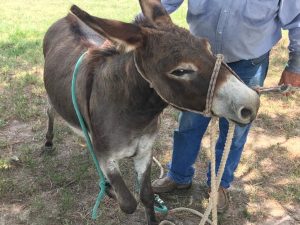I’m so pleased to feature a guest post from J.D. Wininger whose posts on his blog are fascinating snippets of spiritual lessons based in experiences with the animals on his ranch. I love every post he writes and always learn and am inspired.
When I read the following on his blog, I knew I had to ask him for permission to share it. With his permission, I’m featuring it here with my gratitude. I encourage you to check out his website: www.jdwininger.com
Learning to Trust 
By J.D. Wininger
Every six to eight weeks, Bubba and Ryan, our farriers, come out to inspect the hooves on our donkeys, Magic and Elpis. The name “Elpis” is pronounced “Elpeace” and is Greek for “hope.”
When Magic, the “old man” of the duo, requires trimming, he gives his feet to them easily and enjoys a comfortable pedicure. Trimming Elpis, who is new to this whole process, is not yet as easy. In her defense, being handled, much less trimmed, is a new experience.
When donkeys, who are social animals, bond with their caretaker, they become best of friends. Until then, their cautious nature requires lots of patience and understanding as they develop trust. When Elpis arrived here last year at our Texas ranch, the Cross-Dubya, it was almost a year of patient bonding before I knew we could introduce her to hoof care.
A donkey’s hooves differ greatly from a horse.
The donkey uses the front of their hooves more than a horse and must be trimmed differently to maintain proper alignment and balance. Maintaining foot and hoof health, our farrier helps ensure they can walk, run, and play with more comfort. Long or untrimmed hooves are a major cause of stumbling and can cause great discomfort and lead to injury. In the wild, horses and donkeys almost never need trimmed because they walk or run everywhere. In contrast, “kept” equines normally spend their days in confined spaces with soft soil and grassy pastures, resulting in less hoof wear.
When the day came for Elpis’ first trimming, the farrier Bubba and his apprentice, Ryan, knew they were in for a long morning. At first Elpis resisted having her foot secured by a soft rope and pulled up. But little by little, Ryan, with Bubba’s supervision, treated her gently as he positioned her in what seemed to her an unsafe position. Through a long process of lifting and then releasing her foot, along with lots of encouragement, soft touching, and kind words, Elpis became convinced he wouldn’t hurt her. She trusted him to restrain her foot and lift it up so that he could trim her hoof safely.
Many people think donkeys are stubborn. That’s just not true. They are actually intelligent and fast learners.
If you want to entertain them, give them a puzzle to solve. Mine open gates and turn on water hydrants if I don’t secure them. They also love to sneak up behind me to steal a mouthful of feed or nip at my backside or shoulder. If I suddenly turn to face them while walking across a pasture, they gleefully scamper away and wait for me to resume.
Unlike horses, a donkey doesn’t flee to escape danger. They often stand their ground and observe, almost analytical.
Donkeys have a highly developed sense of self-preservation and aren’t afraid to protect themselves when they feel threatened. With exceptional memories, donkeys will remember good and bad experiences and often base their behavior on those memories. A donkey doesn’t see their behavior as being good or bad, only was it effective for them (i.e. did they get what they wanted?). CLICK TO TWEET!!
As I observed what Elpis was learning, I saw many similarities to the way the Holy Spirit has calmly guided me to learn His lessons of seeing God as trustworthy and gracious. By Bubba restraining Elpis’ movements, yet giving her the freedom to learn and decide, she quickly established trust with the farrier.
Making sure the session ended with a positive memory reminds me of how God rewards us as we learn His ways. It reminded me the great thing about valleys is that they’re surrounded by mountaintops. If I am faithful to make it through the valley of learning, God is faithful to reward me with the next mountaintop.
 Thank you, J.D. for sharing this fascinating story and metaphor about our spiritual growth. I was so inspired by it because it fits so well with the principles of my book Never Ever Be the Same: A New You Starts Today (co-authored with my husband, Larry). And they are also the ideas Larry and I use in our lay counseling ministry. Here’s a summary:
Thank you, J.D. for sharing this fascinating story and metaphor about our spiritual growth. I was so inspired by it because it fits so well with the principles of my book Never Ever Be the Same: A New You Starts Today (co-authored with my husband, Larry). And they are also the ideas Larry and I use in our lay counseling ministry. Here’s a summary:
We believe when we are children (including the teen years), we experience wounds during which we sense “messages” of our worth and value—which usually are negative messages against the truth of God’s loving view of us. Then we absorb those lies into our belief system and make a kind of “vow” of how we’re going to avoid the pain/message next time. This “vow” involves some kind of action/response and we form self-protective sinful strategies. Those strategies leave out God and His kingdom perspective. Yet we still depend upon the lie and when that strategy is threatened, we become “hooked”—acting in some way contrary to the fruit of the Spirit. Only by recognizing when we are motivated to protect ourselves are we able to repent from our sinful commitment and surrender to God’s view of us and whatever He has for us.
So how does that apply to Elpis–and us–learning to trust the Farrier/God?
God works His heart transformation in us like JD, her owner, and the farrier does with Elpis:
- God gently works with us little by little stretching our “comfort zone” so that we see our need of Him and recognize our fears are based in lies. CLICK to TWEET!
- God designed us originally to “run” in the abandon of obedience without the need of containment. But Eve and Adam’s decision in the Garden put us in the confined spaces of a stifling fear and careful self-protection. The freedom of entrusting ourselves to God as we romp in joy is gone.
- We have memories like donkeys that have evaluated what’s good or dangerous based on past experiences. We don’t think our behavior is bad or good. “It’s just the way things are and should be. What else can I do? It’s the only choice I have. Otherwise that bad thing will happen again.”
- God uses the “farrier,” the challenges of life, to pull up our leg into a position that seems unsafe. We don’t like it and we fight against the Father’s wisdom. He allows us to sovereignly experience the consequences even as He watches over us. Over and over again, He gently challenges us to trust Him and believe He only intends our good.
- If like Elpis we decide the “farrier,” our Father God, can be trusted (who provided the challenge) we surrender and believe “even if I judge this circumstance something ‘bad,’ I’ll trust God knows how it’s good. Lord, your will be done.”
I feel just like Elpis on many days. Can I trust the farrier?
In what ways has God restrained you as you learned to trust Him? What did you learn about God as you went through the process?
 Texan J.D. Wininger is an award-winning writer and speaker who teaches compelling lessons in faith and writes heartfelt devotionals and books to glorify God. He has written for national magazines, CBN.com, Lighthouse Bible Studies, and contributed to several books. When not working his Texas ranch, He and his wife Diane share God’s love in surrounding communities. Website: https://jdwininger.com/
Texan J.D. Wininger is an award-winning writer and speaker who teaches compelling lessons in faith and writes heartfelt devotionals and books to glorify God. He has written for national magazines, CBN.com, Lighthouse Bible Studies, and contributed to several books. When not working his Texas ranch, He and his wife Diane share God’s love in surrounding communities. Website: https://jdwininger.com/

I’m both humbled and honored to be able to share with your audience Ms. Kathy. Thank you so much for all your encouragement and support ma’am. I can’t wait to host you on my blog one day soon my sweet friend. Maybe you and Mr. Larry can once again tag team another God-honoring post to share with my friends. God’s blessings ma’am; I’m praying many are moved by our words.